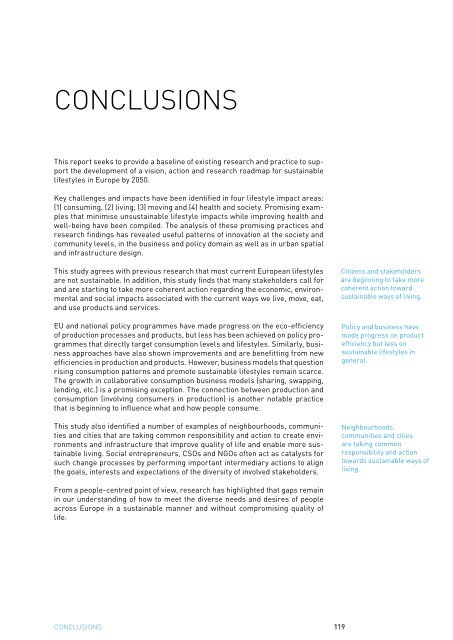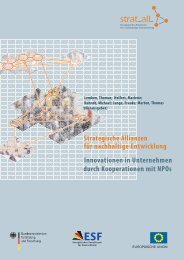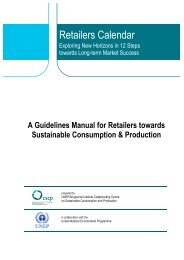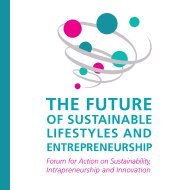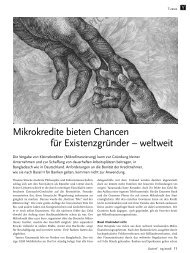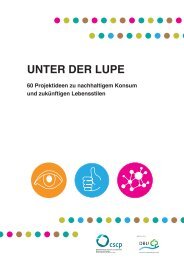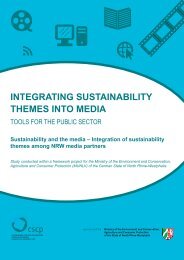today's facts & tomorrow's trends - SPREAD Sustainable Lifestyles ...
today's facts & tomorrow's trends - SPREAD Sustainable Lifestyles ...
today's facts & tomorrow's trends - SPREAD Sustainable Lifestyles ...
You also want an ePaper? Increase the reach of your titles
YUMPU automatically turns print PDFs into web optimized ePapers that Google loves.
Conclusions<br />
This report seeks to provide a baseline of existing research and practice to support<br />
the development of a vision, action and research roadmap for sustainable<br />
lifestyles in Europe by 2050.<br />
Key challenges and impacts have been identified in four lifestyle impact areas:<br />
(1) consuming, (2) living, (3) moving and (4) health and society. Promising examples<br />
that minimise unsustainable lifestyle impacts while improving health and<br />
well-being have been compiled. The analysis of these promising practices and<br />
research findings has revealed useful patterns of innovation at the society and<br />
community levels, in the business and policy domain as well as in urban spatial<br />
and infrastructure design.<br />
This study agrees with previous research that most current European lifestyles<br />
are not sustainable. In addition, this study finds that many stakeholders call for<br />
and are starting to take more coherent action regarding the economic, environmental<br />
and social impacts associated with the current ways we live, move, eat,<br />
and use products and services.<br />
EU and national policy programmes have made progress on the eco-efficiency<br />
of production processes and products, but less has been achieved on policy programmes<br />
that directly target consumption levels and lifestyles. Similarly, business<br />
approaches have also shown improvements and are benefitting from new<br />
efficiencies in production and products. However, business models that question<br />
rising consumption patterns and promote sustainable lifestyles remain scarce.<br />
The growth in collaborative consumption business models (sharing, swapping,<br />
lending, etc.) is a promising exception. The connection between production and<br />
consumption (involving consumers in production) is another notable practice<br />
that is beginning to influence what and how people consume.<br />
This study also identified a number of examples of neighbourhoods, communities<br />
and cities that are taking common responsibility and action to create environments<br />
and infrastructure that improve quality of life and enable more sustainable<br />
living. Social entrepreneurs, CSOs and NGOs often act as catalysts for<br />
such change processes by performing important intermediary actions to align<br />
the goals, interests and expectations of the diversity of involved stakeholders.<br />
Citizens and stakeholders<br />
are beginning to take more<br />
coherent action toward<br />
sustainable ways of living.<br />
Policy and business have<br />
made progress on product<br />
efficiency but less on<br />
sustainable lifestyles in<br />
general.<br />
Neighbourhoods,<br />
communities and cities<br />
are taking common<br />
responsibility and action<br />
towards sustainable ways of<br />
living.<br />
From a people-centred point of view, research has highlighted that gaps remain<br />
in our understanding of how to meet the diverse needs and desires of people<br />
across Europe in a sustainable manner and without compromising quality of<br />
life.<br />
Conclusions 119


